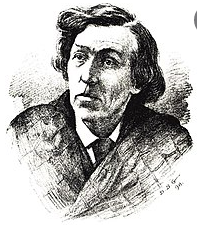Truth and Power.
In college, I was a (late) founding member of the Univ. of Washington Shakespeare Society, together with a number of friends. I’m not sure the Society lasted much beyond our graduation, and I’ve lost touch with most of those friends, but it was great fun while it lasted, and we put on some excellent productions. Together, we put on Henry IV, part one; Macbeth, Twelfth Night and Romeo and Juliet.
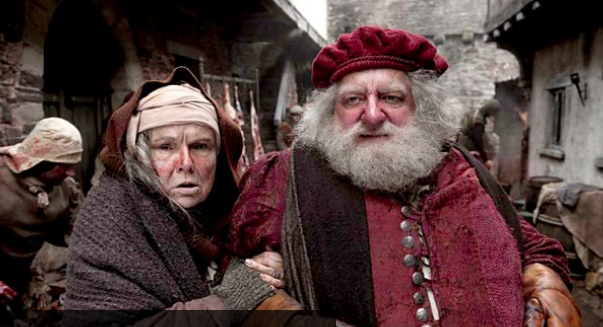
There’s a moment in our production of 1 Henry IV that stands out for me, and asserts itself in my mind more than 25 years after it happened as I look at the skirmishing remains of the “post-truth” political landscape.
In scene II.iv of the play, the sheriff comes to the Boar’s Head Inn to arrest Falstaff for a robbery committed earlier that evening. The stage was a very simple, minimalist set, with carpets hung to conceal the upper stage left and -right entrances. In rehearsal, the actor playing Falstaff suggested that it might be funny for Falstaff to poke his face in from offstage where he’s hiding, through the “arras” at stage left.
It was a funny bit, but as happens so often in Shakespeare, it did even more work. What began as a bit of a goof became something of a sinister moment, too.
In the scene, the sheriff says to Prince Hal that he has testimony that Falstaff committed a robbery earlier that night and is even now there at the Inn. In our production, Falstaff peeks out at this moment. The actor playing the Sheriff does a double take. The Prince sees Falstaff, and he sees that the Sheriff has just spotted Faltaff, but he says, walking downstage: “The man I assure you is not here…” and then he goes on to say that he has sent Falstaff on an errand.
During the performance, there’s a nice laugh as Falstaff sticks out his head and then quickly, guiltily pulls it back in like turtle who can’t be bothered; followed by a long, uncomfortable pause as Prince Hal and the Sheriff look at one another.
In rehearsal, the director had paused the action and asked the actor playing the Sheriff what (as his character) he was thinking.
“I’m thinking that Sheriff or not, I can’t go up against the Prince,” he said.
“Do you just accept it?” the director asked.
“I have to, don’t I? But I don’t like it.”
The scene isn’t over, and Prince Hal further impresses his birthright advantage. When the Sheriff bids Hal farewell with: “Good night, my noble lord,” Hal pauses, making the Sheriff stop is backward, bowing exit, to say: “I think it be good morrow, is it not?”
The Sheriff eats some more shit: “Indeed, my lord, I think it be two o’clock.”
Among other things, 1 Henry IV is about the nature of power and ruling. Prince Hal will become Henry V, scourge of the French, victor at Agincourt, the soul of honor. How, the play seems to ask, did this entitled, drunken rich kid turn into a proper king? His father worries he won’t. Falstaff and his crew worry that he will.
I’ve always found the exchange disturbing.
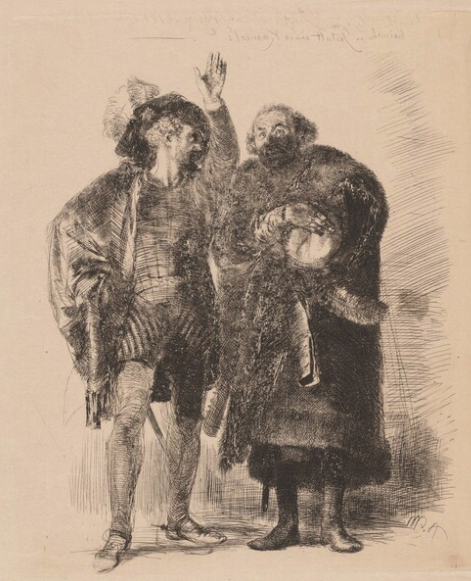
One further example, also from Shakespeare, Hamlet, this time: Polonius has gone to sound out Hamlet’s mind. They gaze at the sky. When Hamlet corrects Polonius about what he sees in the shapes of the clouds, and Polonius readily agrees with everything Hamlet says, the scene is often regarded as being about how transparently craven Polonius is. And he is that, but given the absolute power of the royal family, how—and why—should he be anything different?
The reason these instances keep coming back to me is that in both of these examples the knuckling under by the non-royal characters is obvious, and is clearly about staying on the good side of those in power. There’s dramatic irony in what’s said and what’s known. We in the audience note it, as do the other characters on stage.
What is KEY though, is that the truth is known, agreed upon and shared, but not uttered or acted upon. Which is chilling.
How much worse then is our own post-truth era? When people are forced not just to accept, but to believe the lie—and worse, to make/force others believe it?
Covid deniers, anti-vaxxers, Stop the Steal thugs spring to mind–the elected officials who claim that the January 6 insurrectionists were just a tour.
This is not knuckling under because you have no choice. It’s a complicit trick of the mind to believe “correctly.” In the novel 1984, there’s one particular part that goes a long way toward describing the current overheated state of the Grand Old Party: The key to citizens’ ceding of power is the mental discipline known as Crimestop, defined as, “the faculty of stopping short, as though by instinct, at the threshold of any dangerous thought. It includes the power of not grasping analogies, of failing to perceive logical errors, of misunderstanding the simplest arguments if they are inimical to Ingsoc, and being bored or repelled by any train of thought which is capable of leading in a heretical direction.” I think about that quote every time I remember how some in Congress decried the January 6 hearings as “boring.”

I think of it whenever I see that labrador-quizzical (quizzling?) face Tucker Carlson makes when he wants NOT to understand. The unwillingness (or inability) to grasp analogies, reflects an incapacity for empathy, to be sure, but it also serves as a kind of training.
And just to make sure there’s no back-sliding, there are Telescreens everywhere tuned to Fox News channel to stoke the hatred-abasement matrix. I make my way from Shakespeare to Orwell because there is a kind of double-think/Crimestop consciousness about this unknowing, wholly different from what Elizabethans were subject to.
The “determining factor,” Orwell writes elsewhere in the Goldstein Book passage, “is the mental attitude of the ruling class.” And the level of no-nothing depravity among GOPArty leadership is breath-taking. The bone-chilling part is that they really seem to believe their apocalyptic rhetoric. And they care so little for democracy, that it doesn’t matter if their voters die.
I’m actually hopeful that we as an electorate are waking up. The next election is Nov 8th. We ought to know pretty soon thereafter where we stand on the shifting sands of truth.
# # #
You can check out McCrone’s recent short stories and novels below:
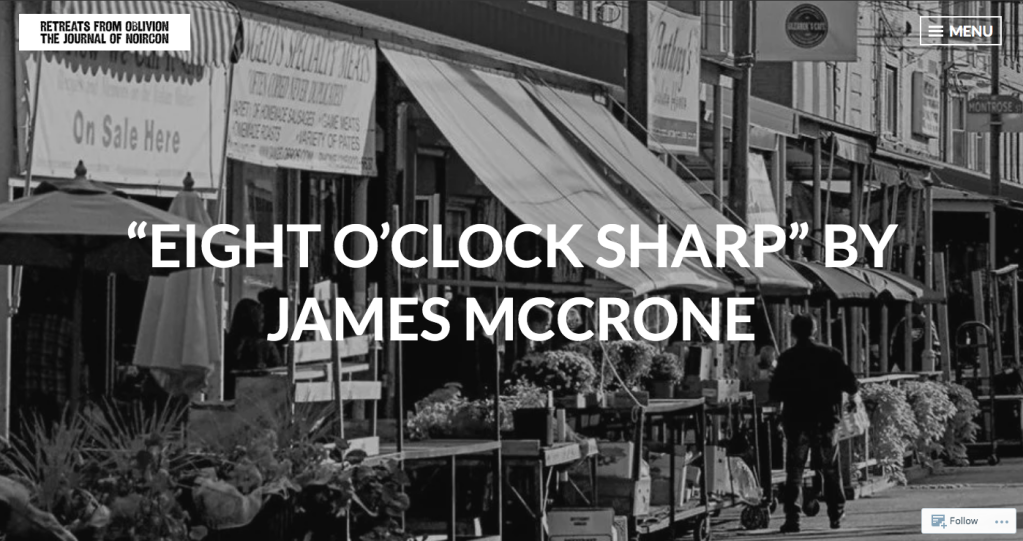
“Eight O’Clock Sharp” in Retreats from Oblivion: the Journal of NoirCon. (free online)
Set in Philadelphia’s 9th Street Market, Thomas is a man outside of time, forgotten, but trying to do the right thing while contending with avaricious forces.

“Ultimatum Games” in Rock and Hard Place magazine issue #7
A rare book heist, bad decisions. The narrator and his partner-in-crime clash over evolving bourgeois norms.

“Nostalgia” in Low Down Dirty Vote, vol. 3
An armed group tries to resurrect a past that never was as they struggle with change.
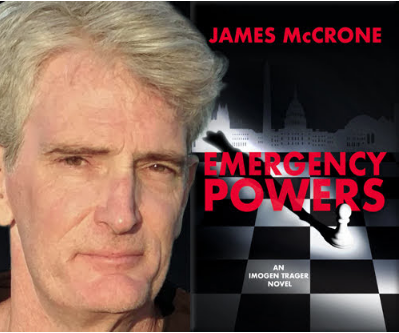
James McCrone is the author of the Imogen Trager political suspense-thrillers Faithless Elector, Dark Network , and Emergency Powers–noir tales about a stolen presidency, a conspiracy, and a nation on edge. All books are available on BookShop.org, IndyBound.org, Barnes & Noble, your local bookshop, and Amazon. eBooks are available in multiple formats including Apple, Kobo, Nook and Kindle.
His next book, w/t Bastard Verdict, is a noir political thriller set in Scotland, currently under review. His work-in-progress is a mystery-thriller set in Oregon’s wine country…A (pinot) Noir, called Witness Tree.
A Seattle native (mostly), James now lives in South Philadelphia with his wife and three children. He’s a member of the The Mystery Writers of America, Int’l Assoc. of Crime Writers, Int’l Thriller Writers, Philadelphia Dramatists Center and is the vice-president of the Delaware Valley chapter of the Sisters in Crime network. James has an MFA from the University of Washington in Seattle.
For a full list of appearances and readings, make sure to check out his Events/About page. And follow this blog!










